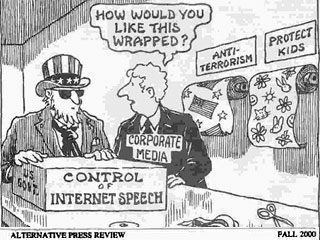Remember when, in the wake of the 9/11 attack, the Patriot Act was controversial, held up as the symbolic face of Bush/Cheney radicalism and widely lamented as a threat to core American liberties and restraints on federal surveillance and detention powers? Yet now, the Patriot Act is quietly renewed every four years by overwhelming majorities in both parties (despite substantial evidence of serious abuse), and almost nobody is bothered by it any longer. That’s how extremist powers become normalized: they just become such a fixture in our political culture that we are trained to take them for granted, to view the warped as normal.
Chomsky on Obama
“Appearing on Democracy Now this morning, Noam Chomsky said the following:
If the Bush administration didn’t like somebody, they’d kidnap them and send them to torture chambers.
If the Obama administration decides they don’t like somebody, they murder them.
Though a bit oversimpified — the Bush administration killed plenty of people, while the Obama administration makes use of kidnapping and torture chambers albeit by proxy; also, as this tweeter noted: it’s ‘unfair to say the Obama administration kills those it doesn’t like, since they claim power to kill people without even knowing who they are’ – this concise comparison just about about sums it up. But it’s important to note that President Obama has progressivism in his heart and that makes all the difference in the world.”
Dogs Kill More People Than Terrorists
A proposal for Copyright Reform
Today’s copyright legislation is out of balance, and out of tune with the times. It has turned an entire generation of young people into criminals in the eyes of the law, in a futile attempt at stopping tech- nological development. Yet file sharing has continued to grow ex- ponentially. Neither propaganda, fear tactics, nor ever harsher laws have been able to stop the development.
It is impossible to enforce the ban against non-commercial file sharing without infringing on fundamental human rights. As long as there are ways for citizens to communicate in private, they will be used to share copyrighted materials. The only way to even try to limit file sharing is to remove the right to private communication. In the last decade, this is the direction that copyright enforcement legislation has moved in, under pressure from big business lobby- ists who see their monopolies under threat. We need to reverse this trend to safeguard fundamental rights.
“Change”
“Presidents running for re-election typically boast of programs they created, people they helped or laws they signed. They talk about rising test scores or falling deficits or expanding job rolls. President Obama is increasingly taking the unusual route of bragging about how he killed a man.”
Opponents Pounce as Obama Trumpets the Killing of Bin Laden – NYTimes.com
Death of a data haven: cypherpunks, WikiLeaks, and the world’s smallest nation
“Sealand was an inspired choice for the data haven project. Roy Bates’s son, Michael, was running Sealand on a day-to-day basis as the Prince Regent by the 1990s. Michael inherited his father’s distaste for authority and his fondness for swashbuckling antics. A professional fisherman, he was hardly a computer geek. But he recognized in Hastings and Lackey the same cheeky outlaw spirit that had brought his own family to Sealand and kept it there for decades. Hastings and his wife flew out to visit Sealand, and a mutual love-in quickly followed.
Like any good dot-com-trepreneurs, Hastings and Lackey incorporated. They called the new venture HavenCo, for “Haven Co-location.” The pitch was simple. HavenCo would offer secure, anonymous hosting from Sealand. Microwave, fiber, and satellite links would provide fast and redundant bandwidth. Sealand’s concrete legs would be kitted out with server racks and uninterruptible power supplies—and then, for additional security, flooded with nitrogen, so that only authorized techies wearing scuba gear could would have physical access.”
Sealand has one of the world’s strangest stories. And each time i read an article about it, it doesn’t get any duller.
So that’s how Opressive Copyright dies…
… With the sound of a thunderous applause. ((http://falkvinge.net/2012/03/25/pirate-party-wins-in-saarland-elections-enters-parliament/))
Dedicated to the Anti-Comments crowd
Megaupload made a LOT of money distributing content which they did not hold the copyrights for. Which means, THEY made money, the authors and publishers and illustrators and musicians – DID NOT.
…
You’re also wrong about the ownership of ideas. True, one person cannot ‘own’ an idea, but he does own the rights for the manifestation of that idea. If you wrote a book – even if it’s the same old story – it’s still something you’ve created for other people to enjoy… if you want to do it for free, it’s your choice! But the world should not FORCE you to do so. That’s why there are copyright laws – we are going to see a whole lot less quality content because of two very big movements:
from Pachino on a comment on Paulo Coelho’s blog
My reply&comment:
You’re missing the point there. Yes, megaupload made money of allowing the download of “free” works. You’re absolutely right on that. And yes, no one paid the authors. Yet why didn’t the authors, publishers & producers got in on megaupload model of business? They could perfectly well have said: “here’s our works, sell them as a part of a cheap 20$ for 25GB of download up to 3 months, no DRM. Pay us the percentage of income.” or even just the percentage of the advertising business.
That would be a simple deal. The consumer knows he’s doing a “legit” business, paying the persons he respects and admires, megaupload would get paid by providing the interface, and the sheer convenience of the whole thing would make people join the idea and spend their money there.
I prefer ten thousand times to pay for my content and get it all nice and clean and properly tagged, with a nice pdf booklet or stuff and to go somewhere “nasty”, full of popups and strange hacks, and never having certainty of what i’m downloading.
But you know what i don’t like? being treated like a criminal moron. Having to spend 10 minutes reading FBI warnings, about me pirating the movie i just bought, or watching unstoppable & unskippable trailers. Or waiting 2 years for the movie that i want to see becomes available in my “geographical dvd” area. Or paying over 25$ for the recording of a music performed by a maestro, orchestra and composer dead over decades¢uries ago. Or not even having the “privilege” to get those works because the editor, publisher or distributor couldn’t care less.
You know what else i don’t like? That if i develop a new combustion engine, or a new cancer vaccine or a new pain killer, or even a new kind of prosthetic material, i get to have the “monopoly” of those “idea fixations” for exactly 20 years. no more. And i have to pay for them in every country in the world. And if it is health related, i will probably spend half of those 20 years doing mandatory safety tests. And somehow, this other guy that “recycles” a impossible love story into book or films, a little folk tune in to a techno music gets to have his life plus 70 years. I’m sorry can you somehow explain to me what possible benefit can came to society from that aberration?
And now you say, “well it’s our god given right! to the ownership of our creations!” Well, sorry, it’s not. The intellectual property laws were enabled and created by the Society, to promote the general development of arts and science because that would in turn benefit the Society. The purpose of the intellectual property laws is not to pamper rock stars or authors or even geeky engineers and chemists, but to benefit the society! That is its ultimate goal. The way how it is done, is a reflection of the ways available on their time.
And here we are, somewhere on the fifth/sixth millennium of human civilization, provided with the most magnificent tool of creativity and information distribution since the Gutenberg’s Press or the alphabet and writing, and there’s some ten thousand schmucks (all of the antiquated publishers and some silly artists) trying to stop the movement and development of rest of the seven billion of us. How do you guess that’s going to end?
My thoughts on S.O.P.A.
“When you’ve eaten an orange, you have to go back to the shop to buy another. In that case, it makes sense to pay on the spot. With an object of art, you’re not buying paper, ink, paintbrush, canvas or musical notes, but the idea born out of a combination of those products.
‘Pirating’ can act as an introduction to an artist’s work. If you like his or her idea, then you will want to have it in your house; a good idea doesn’t need protection.
The rest is either greed or ignorance”
Artists are (usually) not the main problem here, the intermediaries are. They are the ones afraid of losing the power and revenue that comes of mediating between artists & idealists and the world.
The sad part is that they could change as well and get the best spot on the new land grab, but they are just too dumb to see it. So they will wither away, mourned only by the sounds of an angry crowd armed with pitchforks.
Won’t someone think of the children?

Source unknown

